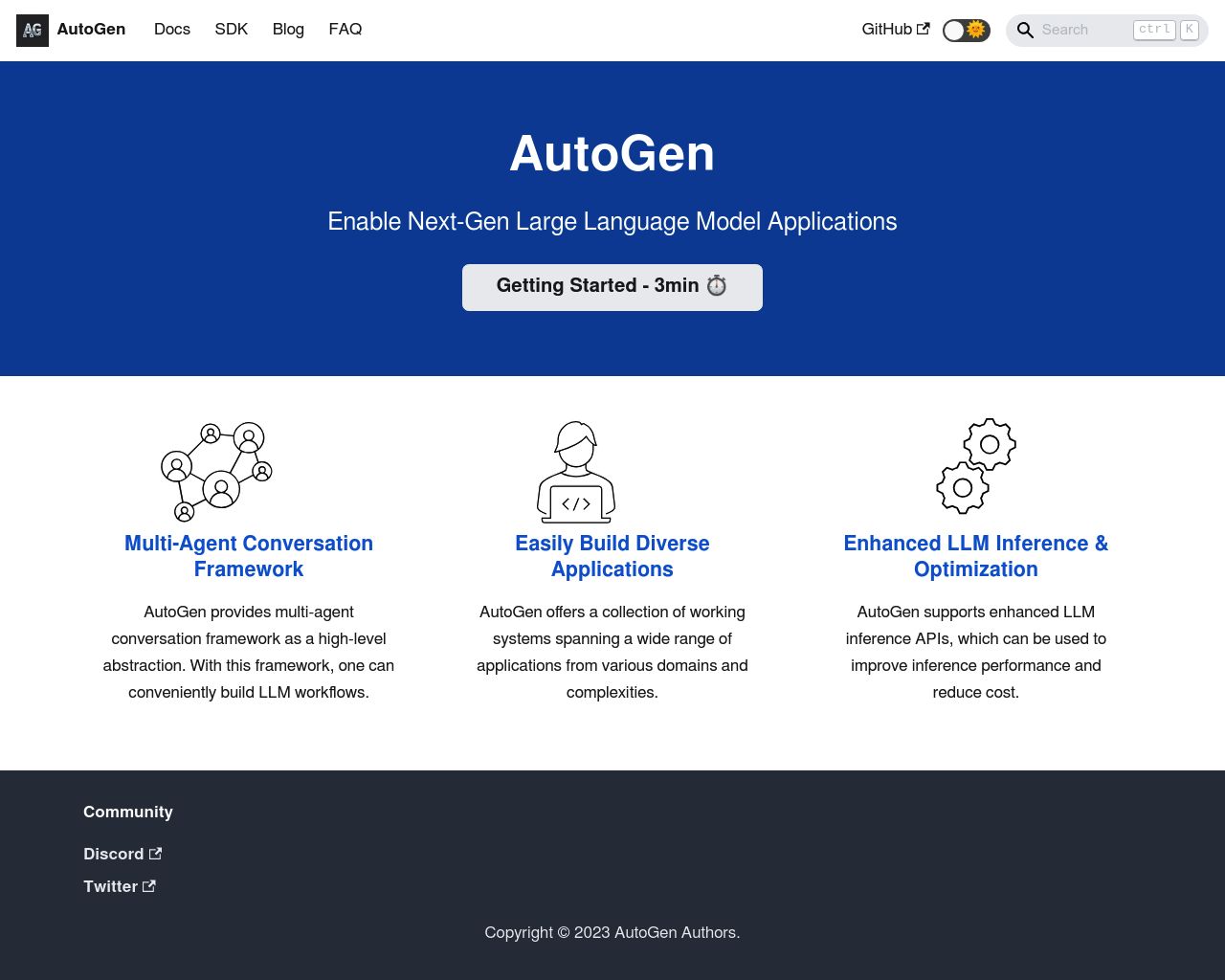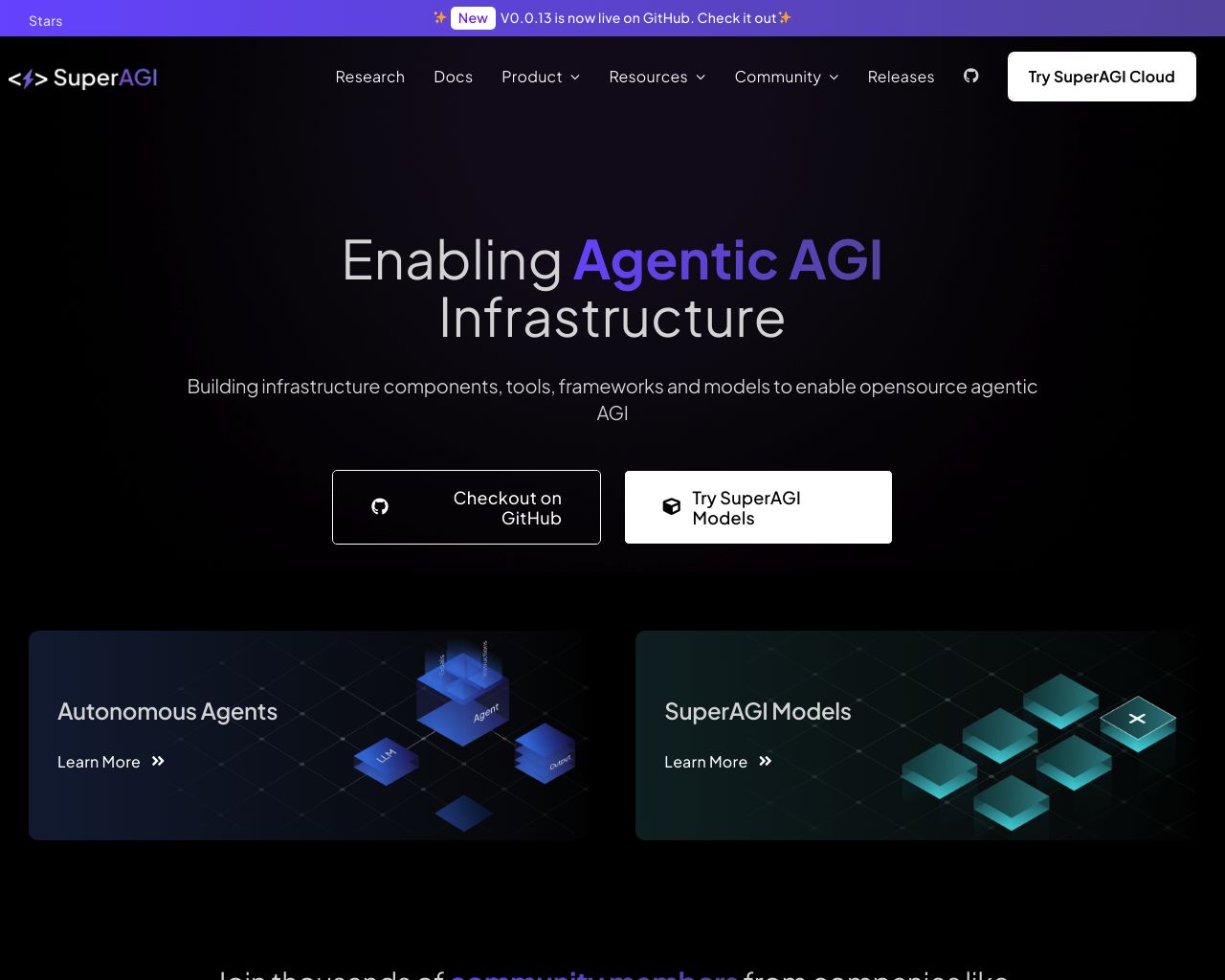AI agents reshape how developers and businesses harness machine learning. AutoGen vs. SuperAGI offer powerful frameworks for building intelligent systems, each with distinct strengths. AutoGen excels in multi-agent conversations and LLM optimization, while SuperAGI provides an intuitive interface and extensive integrations.
This comparison explores their key features, capabilities, and limitations to help you choose the right tool for your AI development needs. We’ll also introduce SmythOS, an alternative that combines ease of use with enterprise-grade security and unmatched versatility, revolutionizing how organizations deploy AI across their operations.
AutoGen Overview
AutoGen empowers developers to create advanced Large Language Model (LLM) applications through multi-agent conversations. This open-source framework facilitates interactions between customizable agents, LLMs, tools, and humans to tackle complex tasks.

AutoGen’s core strength lies in its multi-agent architecture. Agents collaborate autonomously or with human input, adapting to various use cases. The framework optimizes LLM performance through enhanced inference capabilities, including tuning, caching, and error handling.
AutoGen’s core strength lies in its multi-agent architecture. Agents collaborate autonomously or with human input, adapting to various use cases.
Developers can tailor agents to specific needs, integrating LLMs, human inputs, and tools. AutoGen supports both fully autonomous operations and human-in-the-loop problem-solving, offering flexibility for applications requiring human oversight.
The framework demonstrates versatility across applications, from automated task solving and code generation to continual learning and complex problem-solving in group chats. For developers, AutoGen provides debugging tools and logging functionalities, essential for optimizing LLM-based systems.
AutoGen demonstrates versatility across applications, from automated task solving… to complex problem-solving in group chats.
AutoGen includes EcoOptiGen, a cost-effective technique for tuning large language models, highlighting its focus on enhancing LLM efficiency. While the framework offers powerful capabilities, it requires coding knowledge, potentially limiting accessibility for non-technical users seeking no-code solutions.
SuperAGI Overview
SuperAGI empowers developers to create, manage, and deploy autonomous AI agents. This open-source platform streamlines the process of building intelligent systems capable of performing complex tasks independently.

SuperAGI distinguishes itself through extensive tool integration, supporting popular services like Slack, GitHub, and Zapier. This versatility allows agents to seamlessly execute diverse tasks across multiple platforms. The framework’s user-friendly graphical interface simplifies agent interaction and management, making it accessible to users with varying technical expertise.
SuperAGI distinguishes itself through extensive tool integration… This versatility allows agents to seamlessly execute diverse tasks across multiple platforms.
A standout feature of SuperAGI is its ability to run multiple agents concurrently, significantly boosting productivity and efficiency. The platform’s Docker-based installation mitigates common setup challenges related to Python versioning and dependencies, ensuring a smooth deployment process.
SuperAGI’s core strength lies in combining software guardrails for specific development frameworks with generally intelligent developer agents. This approach enables the creation of sophisticated, real-world software systems. The platform prioritizes security and compliance while integrating deeply with existing developer tools such as Jira and Jenkins.
SuperAGI’s core strength lies in combining software guardrails… with generally intelligent developer agents. This approach enables the creation of sophisticated, real-world software systems.
While SuperAGI offers powerful capabilities, users should consider potential challenges. The platform’s open-source nature may require more technical knowledge for optimal use compared to some commercial alternatives. Additionally, as with any AI development tool, users must carefully manage data privacy and security concerns, especially when handling sensitive information.
Feature Comparison
AutoGen and SuperAGI both offer powerful capabilities for building AI agents, but diverge in key areas. AutoGen emphasizes multi-agent conversations and enhanced Large Language Model (LLM) inference, while SuperAGI focuses on autonomous agent creation with extensive tool integrations.
In core components, AutoGen provides robust support for customizable, conversable agents that can interact autonomously or with human input. It excels in facilitating complex multi-agent collaborations and optimizing LLM performance through advanced inference capabilities. SuperAGI, on the other hand, stands out with its graphical user interface and ability to run multiple agents concurrently, enhancing productivity. SuperAGI also offers a wider range of out-of-the-box tool integrations, including popular services like Slack, GitHub, and Zapier.
Regarding security features, both platforms have some limitations. While AutoGen supports OAuth for API authentication, neither platform explicitly mentions advanced security features like data encryption or IP control in their core offerings. This gap in security capabilities could be a concern for enterprises handling sensitive data or requiring stringent access controls.
Feature Comparison Table
| AutoGen | SuperAGI | SmythOS | |
|---|---|---|---|
| CORE FEATURES | |||
| Visual Builder | ❌ | ❌ | ✅ |
| No-Code Options | ❌ | ❌ | ✅ |
| Agent Work Scheduler | ❌ | ✅ | ✅ |
| SECURITY | |||
| Constrained Alignment | ❌ | ✅ | ✅ |
| IP Control | ❌ | ❌ | ✅ |
| COMPONENTS | |||
| Data Lakes | ❌ | ❌ | ✅ |
| DEPLOYMENT OPTIONS (EMBODIMENTS) | |||
| Staging Domains | ❌ | ❌ | ✅ |
| Production Domains | ❌ | ✅ | ✅ |
| Deploy as Scheduled Agent | ❌ | ✅ | ✅ |
| DATA LAKE SUPPORT | |||
| Hosted Vector Database | ❌ | ✅ | ✅ |
| Sitemap Crawler | ❌ | ❌ | ✅ |
| YouTube Transcript Crawler | ❌ | ❌ | ✅ |
Best Alternative to AutoGen and SuperAGI
SmythOS stands out as a superior alternative to AutoGen and SuperAGI, offering a comprehensive AI automation platform with unmatched ease of use and versatility. Our drag-and-drop interface streamlines agent creation, eliminating the need for extensive coding knowledge. We provide pre-built API integrations and templates, significantly reducing setup time compared to AutoGen and SuperAGI’s more developer-focused approaches. SmythOS excels in multi-agent orchestration, enabling teams of AI agents to collaborate on complex tasks with greater efficiency than AutoGen’s conversational agents or SuperAGI’s concurrent execution.
SmythOS stands out as a superior alternative to AutoGen and SuperAGI, offering a comprehensive AI automation platform with unmatched ease of use and versatility.
Unlike AutoGen and SuperAGI, SmythOS offers robust security features including data encryption and IP control, addressing enterprise-level concerns. Our platform supports a wider range of deployment options, from APIs and chatbots to scheduled agents and GPT integrations. This versatility surpasses both AutoGen’s emphasis on LLM optimization and SuperAGI’s focus on autonomous development.
SmythOS’s visual builder and no-code options democratize AI development, making advanced capabilities accessible to non-technical users — a key advantage over AutoGen and SuperAGI’s more technical approaches. We also provide superior data handling with support for data lakes and a hosted vector database, enabling more sophisticated data processing and storage solutions.
By choosing SmythOS, users gain access to a more comprehensive, user-friendly, and scalable AI agent platform. Our solution offers the flexibility and power to handle unlimited use cases, from simple automations to complex enterprise-level applications, surpassing the more specialized focus of AutoGen and SuperAGI. With SmythOS, businesses can rapidly develop and deploy AI solutions that drive innovation and efficiency across their operations.
Conclusion
AutoGen and SuperAGI offer powerful capabilities for AI agent development, each with unique strengths. AutoGen excels in multi-agent conversations and LLM optimization, while SuperAGI shines with its user-friendly interface and extensive tool integrations. Both platforms cater to developers seeking to harness AI for complex tasks, but they may present challenges for non-technical users or those with stringent security requirements.
SmythOS emerges as the superior choice, addressing the limitations of its competitors while offering unparalleled versatility and ease of use. Our platform’s intuitive drag-and-drop interface democratizes AI development, making it accessible to users of all technical backgrounds. We provide robust security features, including data encryption and fine-grained access controls, ensuring enterprise-grade protection for sensitive information.
Our extensive integration ecosystem, supporting over 300,000 APIs and tools, enables seamless incorporation of AI agents into existing workflows. SmythOS’s “Create Once, Deploy Anywhere” approach allows users to build agents that effortlessly integrate across multiple environments, from chatbots to APIs and scheduled tasks. This flexibility, combined with our support for various AI models and multimodal capabilities, positions SmythOS as the ideal solution for businesses seeking to leverage AI’s full potential.
Experience the future of AI agent development with SmythOS. Explore our diverse range of AI-powered agent templates to jumpstart your projects, or dive into our comprehensive documentation to unlock the full power of our platform. Ready to revolutionize your workflow? Create a free SmythOS account today and join the AI-powered productivity revolution.